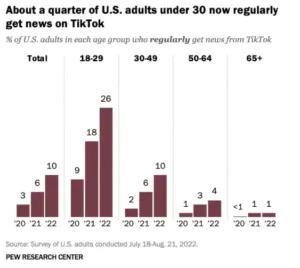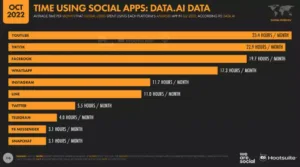Recently, we’ve had several discussions with clients and colleagues about adopting TikTok as a communication platform. Some of the hesitant comments regarding its potential security risks have surfaced:
- “TikTok is a Chinese Spy Tool.”
- “It’s a national security risk.”
- “TikTok will steal our personal information and raid our bank accounts.”
We began by looking at these concerns, reading articles, reviewing the congressional hearing where TikTok CEO Shou Zi Chew testified before Congress, and looking at user data and the site’s popularity. Here is a summary of what we found:
TikTok Security Concerns
Lawmakers in various countries, including the United States, Europe, and Canada, have raised concerns about TikTok’s ownership by the Chinese company ByteDance and its potential security threats. The White House, for instance, instructed federal agencies on February 27 to delete the app from government devices within 30 days, citing security concerns.
The concern lies in the possibility of personal information falling into the wrong hands and being used against individuals or their respective countries. This information includes the videos you watch, comments you write, private messages you send, your exact geolocation, contact lists, email address, phone number, age, search and browsing history, and information about what’s in the photos and videos you upload.
Critics point to Chinese laws that grant the Chinese government the power to secretly demand data from companies and citizens for national security intelligence-gathering operations.
Here is an example of how this information could be used: it may help China uncover personal vices, preferences, or vulnerabilities that could be exploited when recruiting potential spies or targeting individuals for blackmail. Or the collection of data from young teens, who at this point in life, have nothing to hide, may one day assume roles as government or some powerful industry, making their social media history potentially valuable to a foreign adversary.
TikTok does not seem to collect more data than other mainstream social networks – Facebook, Instagram, Snapchat, and Twitter.
While concerns about the potential misuse of personal information are valid, it is essential to balance these concerns against TikTok’s immense popularity and engagement.
Updated: TikTok has decided to move all United States user’s data to Oracle servers, which will be stored in the United States. “The app, which is owned by the Chinese company ByteDance, said in a blog post that it expected to eventually delete American users’ “private data from our own data centers and fully pivot to Oracle cloud servers located” in the United States. It did not say when that would take place.” – New York Times: https://www.nytimes.com/2022/06/17/technology/tiktok-oracle-servers.html
TikTok’s Popularity
TikTok is available in 150 countries with over 1 billion users, 150 million in the United States, and over 5 million business users. In its 10th year, TikTok is still a relatively new social media platform growing in popularity.
Facebook started as a platform for college students and has now become a platform used by older adults.
In its July-September 2021 quarterly earnings conference, Meta’s cofounder Mark Zuckerberg seemed a little worried. He was vocal about it, too. He wants to see a shift. A shift that would take years.
“We are retooling our teams to make serving young adults their North Star rather than optimizing for the larger number of older people,” Zuckerberg said.
Meta’s social media firm Facebook is losing its popularity among teens and young adult users across its key markets, according to numerous studies.
They are jumping to other social media platforms. – Business Insider
Like Facebook’s trajectory, TikTok has a young audience, quickly growing in popularity with other age groups.
Bottom Line: Focus Communications Efforts Where Attention Is Concentrated
As communicators, it is crucial to consider the large audience on the platform and evaluate the risks against the benefits of reaching and engaging with this audience.
While security concerns regarding TikTok exist, it is crucial to understand the data collected by the platform, and assessing its popularity can help inform decisions regarding its adoption for communication efforts.
In the end, even if TikTok becomes more restricted or less popular, there will no doubt be the next platform to get your important message out to a wide audience.
—
Hector Barajas is a seasoned professional with over two decades of experience in politics, legislation, and media. He has a remarkable track record of helping clients achieve their public policy objectives through effective communication strategies involving the press, social media, and direct engagement with decision-makers. www.Amplify360inc.com
Bryan Merica is CEO and co-founder of Unearth, a digital public affairs technology company providing digital communications solutions to businesses, political campaigns, and non-profit organizations. A long-time technology and political enthusiast, Bryan’s work in digital public affairs has changed how campaigns and organizations connect with voters today. Prior to leading Unearth, he worked as a senior strategist at PeopleSoft and gained valuable experience in management consulting with international consulting firms Deloitte and Price Waterhouse.



